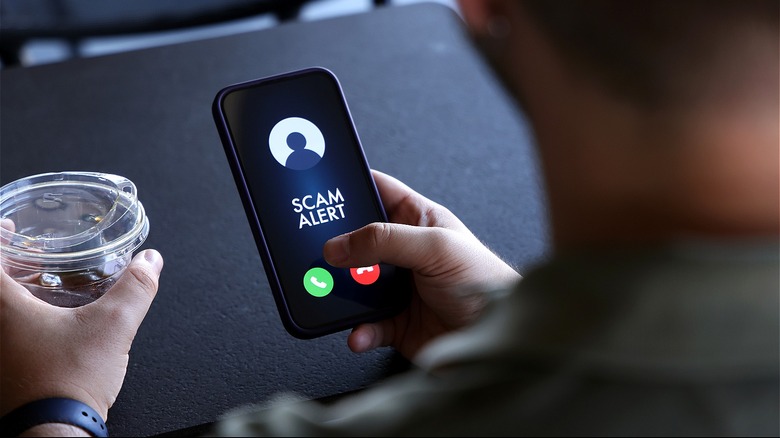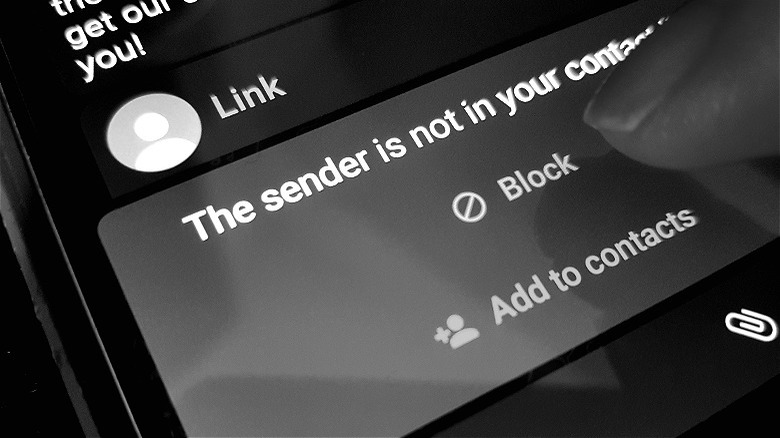Phone Scammers Have Tricked People Out Of An Outrageous Amount Of Money
As if inflation and housing prices weren't bad enough, fraud has also increased. According to data from the Federal Trade Commission, Americans lost more than $10 billion in 2023 due to fraud. Not only is this a record high, but it also marked a 14% increase compared to 2022. Worst of all, the top form of fraud was imposter fraud in which a scammer pretended to be someone that a person would trust (often a business or government representative). While email proved the most common method used by scammers, phone calls came in second and accounted for the highest per-person monetary loss. In fact, the median loss for victims of phone scams was $1,480.
According to caller ID app Truecaller, a whopping 68.4 million Americans reported losing money specifically to phone scams over a 12-month period from 2021 to 2022. In its eighth annual Insights U.S. Spam & Scam Report, the company says the estimated losses from these scams amounted to $39.5 billion. Meanwhile, the FTC reported receiving 2.6 million consumer fraud reports in 2023, which was about the same as 2022, and the growth of these scam activities has led to crackdowns and proposed bans in an attempt to curb rampant fraud campaigns.
While the FTC works with state and federal law enforcement to try and cut down on scams and protect consumers, it could be a while before there is any noticeable change. Until then, you can take action to protect yourself from these scammers by learning about what scams to look out for and steer clear of.
Phone scams to look out for
Some of the most common scams today include imposter scams, online shopping scams, and prize and sweepstakes scams. When it comes to phone scams, it seems the most popular method used by scammers is impersonation. While it might sound simple enough to be able to verify someone as "official" in their capacity as a representative of a business or government agency, many scammers have begun using more advanced technology in their exploits. Scammers often impersonate actual people in their scams, which can make attempts to google their name, job, or organization backfire on would-be victims. Since the scammers use real people to impersonate, searching for them online can actually seemingly verify their authenticity. Further, tactics like caller ID spoofing (which can make the incoming call look legitimate) to voice cloning can add to a phone scammer's legitimacy and further trick consumers.
As Lois Greisman, associate director for the Federal Trade Commission's division of marketing practices, explained to NPR, "What is particularly pernicious about the imposter scams is that there's unfortunately a relatively high rate of people who are duped by them [...] When people think the government is calling you, there's a very understandable reaction to be concerned." In addition to trying to solicit personal information or even payment from you, some scam callers might also be hoping to record your voice. A common phone scam, for example, includes the question "Can you hear me?" By answering, phone scammers can record your affirmative to use in other, less-than- legitimate ways.
Ways to protect yourself
It might sound simple, but not answering your phone for numbers you don't recognize is a highly effective way to avoid any potential scams. If you do answer a call, make sure to hang up without saying anything or pressing any buttons. By engaging with the call, you could, in fact, let the phone scammers know that your phone number is active, which could lead to even more scam calls. Sixty percent of scam phone calls are made using robocalls, which are easily the most prolific method that would-be scammers have in their arsenal. As Matthew Shirley, a cybersecurity services company director, explained to Reader's Digest, "Robocalls are incredibly cheap, costing only handfuls of dollars to send millions of calls. This leads to a surplus of scam call opportunities."
It can also prove important to keep track of the latest popular phone scams, including specific area codes that are popular with scammers. According to Social Catfish, an identity verification service, consumers should avoid accepting calls from the area codes 268, 876, 473, 649, and 284 whenever possible. There's also a growing number of area codes that can appear to be domestic but are actually international (many originating from the Caribbean), which can end up costing you depending on your phone's service plan. You can also sign up for the National Do Not Call Registry, which won't block scam calls but can help with any sales calls you might receive. Reducing your incoming calls can make it more clear when you do receive a scam call.


